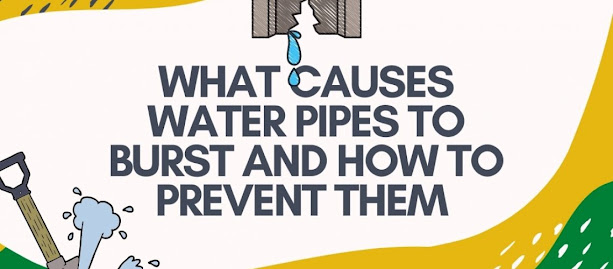What Causes Water Pipe Bursts and What Can Be Done to Avoid Them
Water pipes are necessary parts of your home's plumbing system. Water is carried by these tubes or pipes for you and your family. It also aids in the preservation of your water's quality. Water pipes are available in a variety of sizes and shapes. Water is transported from tanks to faucets using these. It also empties the water in your washbasin.
Meanwhile, there are some circumstances that can cause your water pipes to burst. This can have a significant impact on your home life and may cost you time, effort, and money in the future. As a result, you must take action to keep your water pipes in good working order. The first step is to figure out what is causing them to burst.
Related Articles
- How to Prevent Sewer Backup
- What Are the Most Common Sewer Problems for Homeowners?
- How to Detect A Leaking Pipe
Burst Water Pipes: What Causes Them?
It is critical to understand what causes water pipes to burst so that they can be avoided in the future. The following are the most common reasons for burst water pipes.
- Corrosion. Corrosion is one of the causes of burst water pipes. Metal water pipes are prone to corrosion, which can lead to pipe damage. Corrosion has the potential to reduce the maximum pressure that pipes can withstand. Corrosion can also cause water pipes to deteriorate. Keep in mind that water acidity, high water temperature, high water pressure, and minerals in the water are all causes of corrosion. Although corrosion cannot be completely avoided, it can be slowed.
- Aging. Plumbing materials, including water pipes, naturally deteriorate over time. Pipes can become weakened as they age, resulting in bursting.
- Fittings that are defective. If your water pipes have faulty fittings or improper attachments, the pressure from the water flow can cause these fittings to burst, resulting in flooding from the seams.
- The water has frozen. Frozen water flow causes burst pipes during cold weather.
- Hard water. Water with a high calcium and magnesium content may be harder. Even though it is not harmful to humans, it can accumulate in your water pipes and slow down the flow of water. It may also result in increased water flow pressure, causing your pipes to burst. These elements can slowly corrode water pipes, resulting in water leaks.
- Movements on the ground. Ground movements can also cause your water pipes to burst. It could cause damage to the buried plumbing pipes. Earth tremors and shifting soils are examples of ground movements. Because it is a natural occurrence, you usually have no control over it. Fortunately, proper drainage can help you avoid flooding and other soil movements.
How to Prevent Water Pipe Bursts
Water pipe bursts can cause a variety of issues. Fortunately, there are safety precautions in place to keep water pipes from bursting. These are some examples:
- Seal any leaks that allow cold air to enter your home. You can seal leaks that allow cold air to enter your home where pipes are installed. Examine the dryer vents, pipes, and electrical wiring for air leaks. To keep the cold out and your pipes from freezing, use insulation or caulk.
- Remove the hose from your outside faucet. To avoid draining your hose bib as well as freezing and damaging the device, disconnect the hose from your outside faucet.
- Check your home’s temperature. Avoid allowing temperatures to fall below 32 degrees in areas of your home where water pipes are located.
- Keep your water faucets turned off. During cold weather, keep your water faucets running slowly to maintain water flow and prevent the water line from freezing.
- Installation of heat tape. Heat tape can also be installed to warm the pipes in cold weather. If you are unsure how to install it, you can seek assistance from a professional plumber.
- Hire a professional plumber. Hiring an expert and knowledgeable plumber, specifically one who specializes in sewer and drain work, is one of the best ways to prevent your water pipes from bursting. They have the best strategies for keeping your water pipes in good condition. You can avoid the consequences of burst water pipes by doing so.
How to Determine If Your Water Pipes Have Burst
- Stains on the walls. Discoloration on your ceilings or walls is one sign of a burst water pipe. It could be caused by a leak or a burst pipe. In this case, you should contact a plumber right away to avoid mold growth and further damage.
- Strange odor coming from your water pipes. If you notice a strange odor coming from your water pipes, you have a burst pipe. If this occurs, it is best to seek the assistance of a plumber.
- Discoloration of water. Water discoloration is another sign of a burst water pipe. If you notice brownish water coming out of your faucets, it could be due to rust in the water pipes. It indicates that your pipes are corroded.
- Water bills are excessive. You may be surprised by your high water bills if your water pipes burst. A plumber is required to inspect your system for potential damage.
Conclusion
To summarize, your water pipes can burst for a variety of reasons. To apply the most effective treatment and prevention, you must first understand what is causing it. It is also critical to seek the help of a professional contractor to solve your plumbing problems.
Water pipes are required for a comfortable home environment. As a result, in order to get the most out of it, you should be responsible for its upkeep. Is this article useful to you? Please share your thoughts in the section below.
Have a Bursting Pipe Problem in Seattle, WA?
If you’re looking for a licensed and insured plumbing company that offers the best sewer replacement services in Seattle, to resolve a bursting pipe problem you may be having in your home, give our plumbers a call at the Pipe Doctor! We provide fast and reliable pipe repair service in the Seattle area at an affordable price. Simply call us at (206) 676-2192!
The Pipe Doctor
12345 Lake City Way Ste 311 Seattle, WA 98125
(206) 676-2192
thepipedr@gmail.com
Other Plumbing Services
External Links:
Tumblr: https://thepipedr1.tumblr.com/
Instagram: https://www.instagram.com/thepipedr1/
Trello: https://trello.com/thepipedoctor
Twitter: https://twitter.com/The_pipedr


Comments
Post a Comment